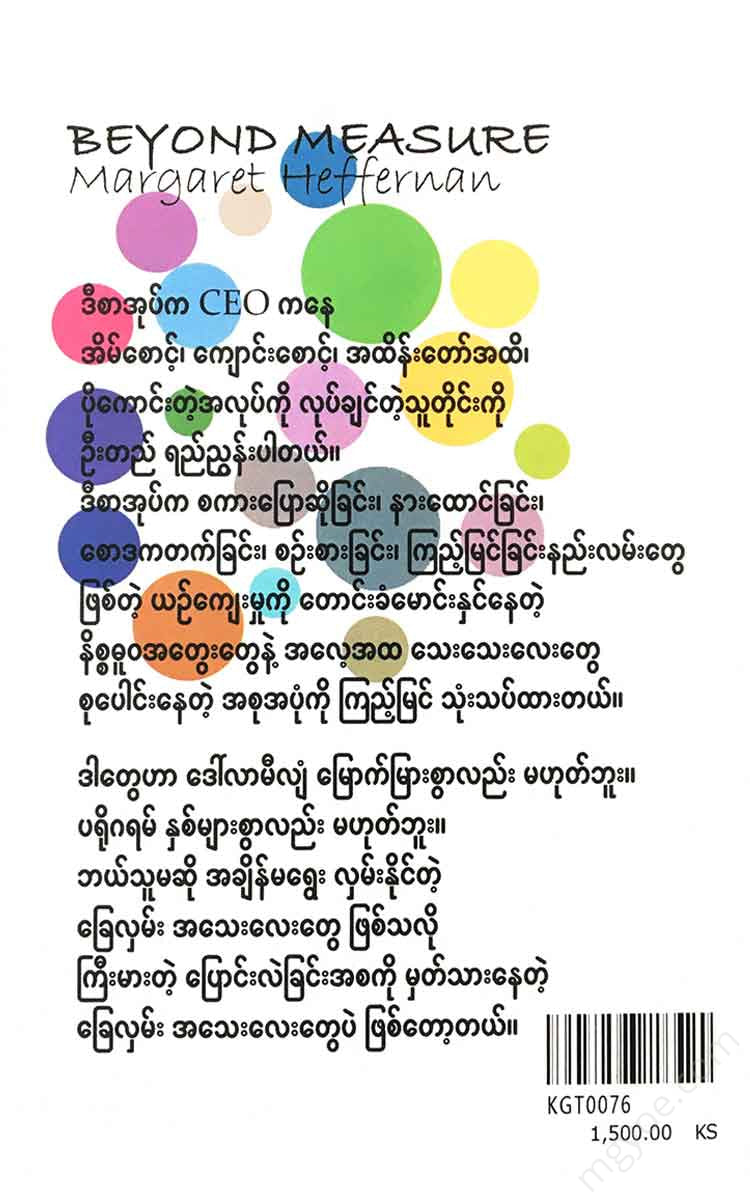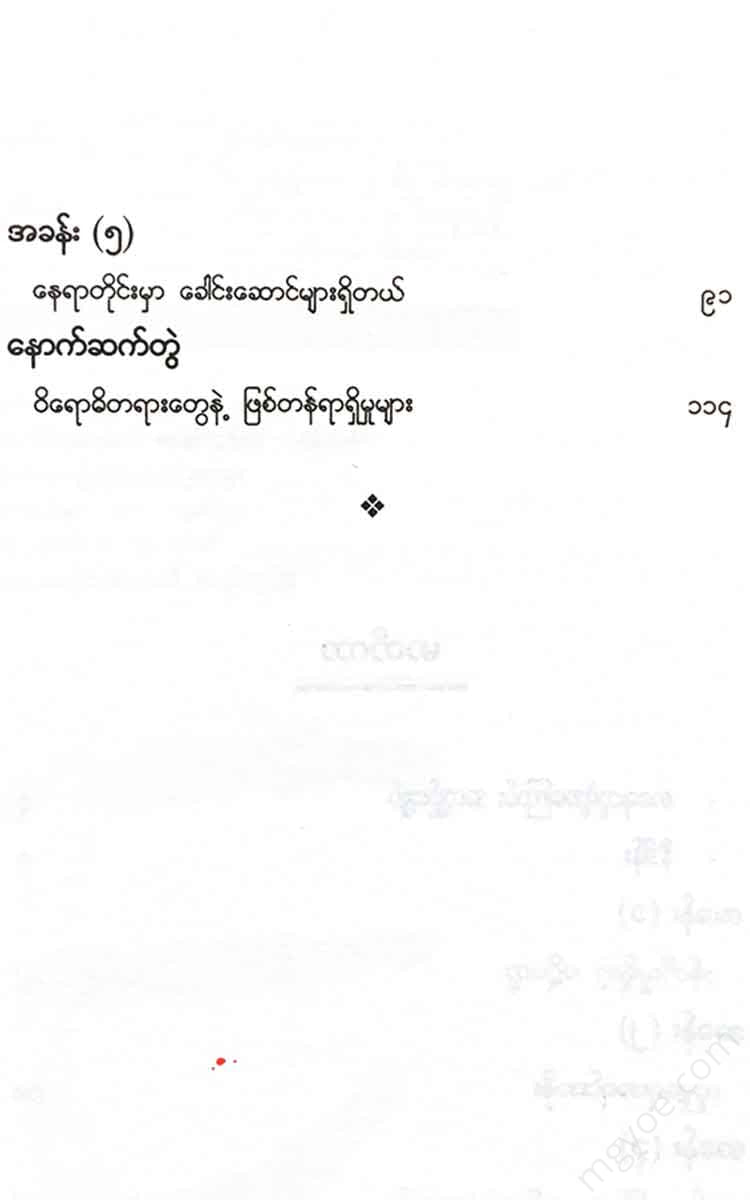စိတ်ကူးချိုချိုစာပေ
Good - beyond measure.
Good - beyond measure.
Couldn't load pickup availability
Introduction
We measure everything in our work, except for the important things. Numbers are convenient. Revenue, expenses, productivity, engagement, turnover, creating an illusion of control. But when we are faced with success or failure, from CEO to housekeeper, the only thing we can point our finger at is culture. Beyond measurement, sometimes dramatically beyond what can be described, culture has become the secret ingredient of organizational life, and the one thing that makes the difference is no one component.
The paradox of organizational culture is that it can make a big difference. This big difference is made up of small actions, habits, and choices. This collection of behaviors, from the top to the bottom of an organization, is the culture of the organization that creates itself, from inside and outside the company. It can be chaotic, but it also affects everything anyone does.
This is both a curse and a blessing. The curse for leaders is that culture is dependent on the sense of its own free will. It is not only beyond their control, but it is beyond their control. We cannot measure culture. But we can measure the high failure rate for programs that target this culture. It is somewhere around 70%. So the idea that culture is difficult to define, difficult to manage, and impossible to command is a myth.
There is also a blessing in the fact that organizational cultures are not uniform systems. Small changes, listening, asking questions, sharing information, change the interconnectedness and pervasiveness of productive systems beyond the concept of innovation. Each of these small things drives responses that influence the entire system.
This insight is that large cultures evolve based on the small contributions of individual people.
In 1972, a British Airways plane took off from the ground just three minutes after takeoff. It crashed instantly, killing all 118 passengers and crew. No change in leadership has been able to explain this tragedy. What makes this tragedy so bitter is that the problems that led to the crash were known long ago, and the fear and ignorance that had prevented the death of the pilot were the only way to prevent it. Later, when the investigation was conducted, the hard questions that were asked, the unspoken words that were not spoken, were revealed, and the pain and anxiety that were shared were felt. Every small obstacle between people and processes threatened the entire industrial world.
What emerged from this disaster was a way of working together, building trust, working together, sharing ideas, and these are the things that have changed the culture of civil aviation. Where there was secrecy, there is now openness. When mistakes are exposed, they are now recognized as lessons to be learned.
This new way of working is called a rational culture. It transforms transportation into the least conscious form possible, making it as safe as possible.
Today, we need a “culture of fairness” across all of our workplace environments. Not only to prevent bullying, but also to draw out the best ideas, observations, and concerns from individual employees.
Our challenge is too great, and time is as strong as ever. Too much of human potential is locked up within organizations, to some extent wasted.
Let's let it go. 'A rational culture is one that values authenticity, efficiency, and the brilliance of the individual. Their rewards are imagination, intelligence, and truth-telling, and victory.
The path to success is full of mistakes. It is more important to encourage ambition and build trust rather than rigid adherence. At the heart of any culture is a concept of leadership that is not about second-guessing markets or stakeholders. It is about encouraging people to speak up and think for themselves, for the benefit of others. .
News should not be brushed aside, but kept close to the heart. Because they represent power. If there is a clear diagnostic test for the indicators of a healthy workplace, we can optimize the quality of the connections and slow down the flow of ideas that characterize them.
"If everyone doesn't succeed, there's no such thing as a successful person," says Randy Pardish, CEO of Ocean Spray. "That's a self-evident statement. And it should be. But what I've seen in companies around the world, both in the US and in the UK, is that people are stagnant because of the degrees of stagnation. The CEOs I've worked with are frustrated by the lack of energy in their workforce. When I talk to employees, they're also frustrated by the rules and regulations that are stifling their thinking. I suggest that leaders seem to know everything, but their beliefs are holding them back. Their followers are silent, but they want to speak up. Everywhere, everyone is complaining about their own failures.
The people I interviewed seemed hesitant to share a big idea, afraid of being seen as crazy, out of line, out of strategy, too wild, too pushy. They were so inscrutable that they were left with no choice but to be quiet, not only because of the price of their feelings of not being able to alert others to the problems, but also because they felt they couldn't challenge or explore new ideas. And so, in the silence, innovation faded away.
In every country I’ve visited, locals say the challenges are their own. In Hungary, history is held in high regard by the fear of being told. In Singapore, the desire to save face is complicated. In Latin America, the criminal is a dignified person. The British blame tradition for their isolation. Americans see themselves as followers of
I conclude that the desire to satisfy this conflict is universal, draining our energies and courage.
When I talk to individuals about these opportunities that are being wasted, they only talk about one thing: “culture.” Culture has become an alibi for the crime. It’s a scapegoat on the altar to be sacrificed. Everyone is to blame for the mistakes. Who can fix this? Everyone. So this book is for everyone , from the CEO to the janitor.
It is aimed at everyone who wants to go to a good place.
This book examines the collection of small, enduring ideas and practices that drive culture: ways of talking, listening, arguing, thinking, and seeing. These are not millions of dollars or years of programming. They are small steps that anyone can take at any time, and they are small steps that mark the beginning of big change.
This book doesn't give you simple formulas for overnight transformation. Instead, it gives you a lot of thinking here. But when you stop and think about it, you'll see what you're doing. If you let it go, you'll end up second-guessing yourself over and over again.
So when we find what we believe in, we need to say who and what we are.
Beyond measure.
If we stop and think, what we will rediscover are courage, ingenuity, passion, imagination, passion, discovery, appreciation, and work that can inspire.
In short, all the important things in work are beyond measure.











